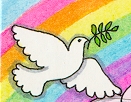| The WCC Education and Ecumenical Formation (EEF) team tries to identify and discover new approaches, styles and methodologies of ecumenical learning. It is also interested in the processes of knowing, thinking and doing among excluded sectors in society, such as women, children, and Indigenous Peoples.
Recognizing the need for education to be sensitive to the neglected potential of cultural diversity, and the contribution that Indigenous knowledge systems can make to ecumenical learning, EEF and IPP are together coordinating a study on Indigenous Peoples and education. A look at how values, as well as knowledge, are transmitted within Indigenous communities may contribute to an understanding of how to live within cultural diversity.
Three regional consultations - in Asia-Pacific (July 1999), Latin America (April 2000) and Europe-North America - have brought/will bring together educators in Indigenous organizations and learning institutions as well as from church institutions at regional and national levels. Publications from the consultations include illustrated resource handbooks. A final meeting in Norway in September 2001 of participants at the various regional consultations will record reflections, analysis and conclusions in an overall study report. |
|
For thousands of years and in spite of colonization, Indigenous Peoples used traditional knowledge systems to sustain themselves and maintain their cultural identity. This vast reservoir of knowledge - social attitudes, beliefs, principles and conventions of behaviour and practice - has much to teach us.
Traditional knowledge systems are characterized and shaped by collective awareness
of human beings' kinship with nature, and the sacredness of creation.
that spirits are present in nature;
that all life-forms are interconnected and inter-dependent and that human beings thus have no right to exploit nature in their own interest.
They are also distinguished by their reliance on
oral tradition: knowledge transmitted through stories told from one generation to another; and
learning through observation and experience. |
Asia-Pacific consultation, Philippines, July 1999
Participants affirmed the need for Indigenous Peoples to preserve their culture and traditional values and revitalize their learning systems, but at the same time to learn new skills to survive in rapidly changing environments. Key issues identified were: land and ancestral domains; the arts and the mis/appropriation of indigenous arts and crafts; history, including the documentation of local histories and a review of the historical process; language; theology and indigenous spirituality, and the need to analyze social movements in relation to the struggles of Indigenous Peoples.
Churches and related institutions were challenged to re-examine their policies and practices regarding work with Indigenous communities. Too often, the former tend to go along with state systems, failing to recognize cultural diversities and the variety of needs. In their education work, churches need to ask how they can recognize, respect, preserve, learn from, and support Indigenous Peoples' knowledge systems. | |


